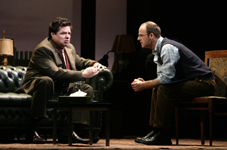
Paulanne Simmons
"Shining City" Could Have Been a Lot Brighter
 |
| Oliver Platt and Bryan F. O'Byrne in "Shining City." Photo by Joan Marcus. |
"Shining City"
Directed by Robert Falls
Biltmore Theatre
261 West 47th St.
Opened May 9, 2006
Tues. thru Sat. 8 p.m., Wed. Sat. & Sun 2 p.m.
$80-26 (212) 239-6200 or www.telecharge.com
Reviewed by Paulanne Simmons May 6, 2006
That Connor McPherson is adept at portraying the supernatural manifestations of psychic paint was made evident in his much acclaimed "The Weir." But it is not clear whether "Shining City," which opened May 9 at the Biltmore Theatre, will be a repeat of past success.
The drama is directed by Robert Falls, whose 2003 revival of "Long Day's Journey into Night" won three Tony Awards. It stars Brian O'Byrne ("Doubt," "Frozen") as Ian, a therapist whose relationship with Neasa (Martha Plimpton) is falling apart as a result of her infidelity and his conflicted sexuality; and Oliver Platt (film credits include "Casanova" and "Ice Harvest") as his patient, Jon, who seeks help after seeing the ghost of his recently deceased wife.
All of the scenes, between Ian and Jon, between Ian and his Neasa, between Ian and a male prostitute named Laurence, take place in Ian's office, where he has moved after leaving Neasa and their baby.
The juxtaposition of the two relationships, one terminated by the death of the wife, the other by a dearth of love, is absorbing and powerful. The use of the therapist/patient relationship as a means of exploring the inner demons of both has certainly proven effective (Peter Shaffer's "Equus" comes to mind). And both Ian and Jon have compelling stories.
McPherson has written a play that might have been exceptional. But, for many, his stuttering, hesitating language may present one barrier to following these stories. The other barrier is the unrelentingly shallow interpretations of O'Byrne and Platt.
Many playwrights want their dialogue to sound natural to
their characters, whether they be from the Irish working class or British
upper class. But an exact or an exaggerated rendition of the jerky, stuttering
speech we are surrounded by every day does not always benefit the play
or the actors.
In "Shining City," O'Byrne and Platt say 'you know" so
many times one had an almost incontrollable urge to jump onstage and stuff
something into their mouth. It was like watching two men with the same
tick. Interesting for a bit, but after a while you just want them to stop.
The scenes between Ian and Neasa are only slightly better.
It's hard to understand why two such accomplished actors as Platt and O'Byrne would deliver such one-dimensional performances. It is tempted to blame Falls' direction. Certainly this production suffers from tunnel vision and unrealized possibilities.
When Jon tells Ian about his dissatisfaction with his marriage, his disappointment at not having a child, his lusting for another woman and his failed attempt at sex with her, he is tense, on edge, almost ready to bolt. This is not inappropriate. But his tone never changes. The act of narrating his story has no effect on him.
Ian listens with very little comment. Often he seems more nervous than his patient. It's hard to understand why he ever became a therapist or why Jon has any confidence Ian will be able to help him
Then, at the end of the play, Jon comes to the office with a huge package. In it is a gift for Ian, who he believes has been of invaluable assistance in helping him get rid of his inner demons. This may come as something of a surprise to many in the audience, who never saw Ian doing much by way of therapy. Whatever happened between these two men must have been offstage.
Far more solace, in fact, was offered by Lawrence (Peter Scanavino, a relative unknown who delivers the play's most outstanding performance). Scanavino is the only actor who creates a character who reacts, who has more than one side to his character. He makes Laurence sad and at the same time noble.
In other hands "Shining City" might have been a piercing exploration of guilt, and if not redemption, then at least survival. But misdirection has turned the play into a quirky ghost story with an ending that causes the heart to leap. But a big jolt at the last second can't make up for all the missed opportunities that have come before.
| museums | NYTW mail | recordings | coupons | publications | classified |
